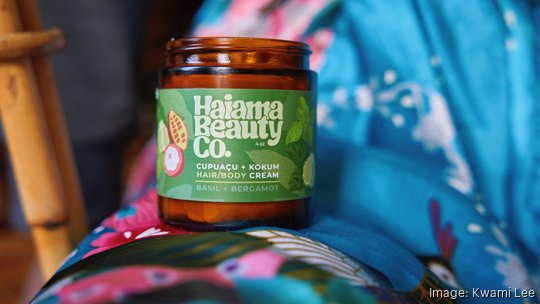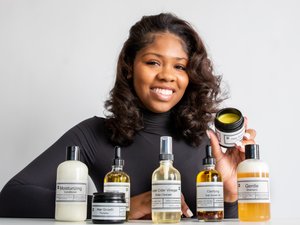
The founder of a Philadelphia natural hair care line geared toward Black consumers with Type 4 hair is looking to raise upwards of $300,000 this year to scale her brand.
The roots for what would become Haiama Beauty started several years ago when Allison Shimamoto was earning her MBA at the University of Virginia’s Darden School of Business. In one class, Shimamoto and her classmates were tasked with pitching a business idea. One of the ideas Shimamoto pitched was a natural hair care line for those with Type 4 hair. Type 4 hair – a reference to a numeric system corresponding to hair texture – is characterized by coiled, kinky hair and primarily found on Black women.
The idea was met with resounding support and Shimamoto spent the remainder of the class working on the business model and getting feedback from fellow students who also have Type 4 hair. During that time, she concocted potential products and had classmates test them.
That wasn’t Shimamoto’s first foray into the natural hair care space. Nearly a decade prior, around 2011, she underwent her own transition from chemically treated and relaxed hair to natural hair. To do so, she discontinued practices used to achieve straight hair – which involves salon appointments where chemicals are applied to the hair and scalp every four to six weeks. Concerned about the health impacts and wanting to embrace her hair's texture as she entered adulthood, Shimamoto decided to go natural.
Growing out her hair and then cutting off the chemically treated ends was an “emotional but empowering experience,” she said. “I remember looking in the mirror and actually seeing myself for the first time.”
Through Haiama Beauty – named for a river in Guyana, where her father’s family is from – she wants to empower others going through and who have gone through that journey as well as those who have long embraced natural hair but want products that eschew synthetics.
The lack of such options was what prompted Shimamoto’s interest in creating her own line. “The products on the market were falling short,” she said, noting some didn’t leave her hair feeling the way she wanted, but more importantly, many weren’t made with natural ingredients. “There was a lot of sulfates, a lot of silicones or watered-down products, too, so I started to make my products at home.”
Turning to YouTube, Shimamoto soon became versed in natural hair care with a specific focus on the natural aspect. That early do-it-yourself approach became the crux of her business. “We are taking things back to the DIY days where you know what's going into the products, it's focused on premium, high-quality raw materials that are sourced from the regions in which these botanicals grow,” she said.
After earning her MBA in the spring of 2019, Shimamoto officially formed her company, then known as Oemi Botanicals, and entered the market. During that time, she relocated to Philadelphia from Virginia to begin a job with the Boston Consulting Group in marketing strategy and analytics and has maintained Haiama’s headquarters in the city since.
She worked on Haiama on the side until the birth of her daughter in June 2021. Though healthy now, Shimamoto’s daughter was born with a heart condition, which led her to reassess the direction of her career.
“I wanted the flexibility to be able to spend time with her, but also enjoy doing the work that I was doing,” Shimamoto said. So she decided to leave her job the following year to pursue Haiama full-time.
She’s done just that, largely self-funding the endeavor with an initial infusion of between $10,000 and $15,000. In the early days, she turned to Kickstarter for working capital, raising nearly $18,000 during a two-month campaign in 2020. In 2022, the company received a $25,000 angel investment from women and non-binary focused venture capital firm Pipeline Angels, funds that helped secure Haiama’s space at the Bok Building in South Philadelphia, where the company moved into last fall.

Haiama Beauty’s first product was a Cupauçu and Kokum Hair/Body Cream. It today comes in two scents in addition to an unscented option. The Haiama line has been expanded to include a scalp oil, hair growth oil, detox kit and hair teas. Products range from $18 to $32. The original cream and the scalp oil are top sellers.
Shimamoto created the formulations and then worked with a cosmetic chemist to ensure shelf stability. Products took as little as a couple of months to develop and formulate to as long as several years as she refined them based on customer feedback.
The line uses ingredients like sage leaf, fenugreek seed, cocoa butter, cupuaçu, and oils from argan, jojoba, Vitamin E, baobab, eucalyptus, rosemary and tea tree. She has also started formulating with plant-derived squalene, which is rapidly gaining popularity.
With her focus on natural ingredients, sourcing and supply chain have been integral to business and Shimamoto works with an individual who sources directly through farmers in their native regions, which include parts of South America and India.
Such ingredients and sourcing means a slightly higher price point. As such, consumer education is part of the brand’s messaging that “because we're using these raw ingredients, the potency is super high so a little bit goes a long way,” Shimamoto said.
The vast majority of Haiama customers are millennial women, Shimamoto said, adding that women from other generations, as well as some men, also use the products. While Haiama is geared toward those with Type 4 hair, some products like the Cupauçu and Kokum Hair/Body Cream can be used on the skin and appeal to individuals of different races and ethnicities.
At present, about 70% of sales are e-commerce with the remaining 30% coming from in-person and retail sales.
Haiama’s reach is national but Shimamoto is focused on building up the brand in Greater Philadelphia with the goal of expanding from there. She recently launched with Washington, D.C.-based Black-owned beauty retailer Eighth+Kin and is exploring potential salon partnerships and other marketplaces.
To scale the brand, Shimamoto is looking at ways to raise funds, particularly grants. Her goal is to secure between $250,000 and $300,000 this year, funds that would go toward product expansion, but primarily brand awareness.
“To scale and get to that next level, we need funding,” Shimamoto said.
Getting buy-in from investors has proved difficult with many not understanding the scope of the business or its potential market value. A report from MarketResearch.biz shows the global Black hair care market growing from an estimated $9.56 billion in 2023 to over $15 billion in a decade.
Shimamoto hopes that if she lands a grant from a well-known brand like Glossier or the Fearless Fund it will catapult her to greater success with other investors in future.
In the meantime, she will continue with product innovation, including a forthcoming hair oil which she plans to launch this month and a baby and children’s line of products further down the line.







